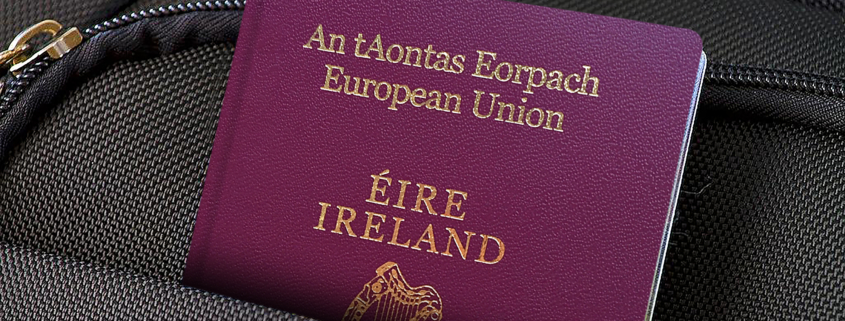Changes to Naturalisation Processing
The Immigration Service Delivery (“ISD”) has introduced “significant changes” regarding the number of proofs required to establish the identity and residence of a person applying for naturalisation (i.e., Irish citizenship), and the requirements in respect of providing a passport. These changes are in the form of guidelines published on the 31st December 2021, effective from the 1st January 2022.
Persons wishing to become Irish citizens based on their residence in the State may apply to the Minister for Justice for a ‘Certificate of Naturalisation’ under Section 15 of the Irish Nationality and Citizenship Act 1956, as amended. The 1956 Act sets out the requirements for naturalisation, and that the Minister retains an ‘absolute discretion’ in respect of her decision to grant or refuse a Certificate of Naturalisation.
The general residence criteria for a standard application for naturalisation is that the applicant resided in Ireland for a five-year period. This period is made up of one years’ continuous residence immediately prior to the application (subject to reasonable periods of absence), and then four years lawful residence in the previous 8 years (before the one-year period). There are different residence periods of different categories of persons, such as refugees and spouses of Irish nationals.
Applicants must provide proof of their residence in the State. The standard application criteria were that an applicant must submit three different kinds of proof of residence for each year being claimed as reckonable towards the residence requirement. For instance, an applicant might provide a doctor’s letter, correspondence from Revenue, and bank statements, for one year, and the same for previous years. The difficulty with this was that the Citizenship Division would often have an inconsistent approach as to what is and is not acceptable proof of residence, despite guidelines being provided in the application form (FORM 8).
However, on the 31st December 2021 the Minister published a notice titled “Scorecard approach being introduced for Citizenship Applications from January 2022”. These new Guidelines provided some clarification over which documents are, effectively, preferred by the Citizenship Division for the purposes of accepting proof of residence in the State. Effective from 1st January 2022, an applicant for naturalisation must reach a score of 150 points in respect of the documentary proof provided for establishing i) proof of identity, and ii) proof of residence.
Proof of identity
The new Guidelines state that the 150 points required for proof of identity can be achieved by provided certain documents which are assigned a points value. For instance, a ‘genuine’ in-date home-country passport is worth 150 points. Whereas a passport expired by no more than 365 days is worth 70 points. A passport expired by more than 365 days is worth 50 points. Where there is a deficit in points, an applicant may provide additional documentation to make up the balance of the required 150 points. Below is a table of the break-down of the assigned points value for the acceptable documentation:
| Genuine Passport (Home Country) | In date | 150 points |
| Genuine Passport (Home Country) | out of date less than 365 days, as per date of Citizenship application | 75 points |
| Genuine Passport (Home Country) | out of date less than 730 days, as per date of Citizenship application | 50 points |
| Home country National Identify document issued in accordance with EU Regulation 2019/1157 | In date | 75 points |
| Home country National Identify document – other | In date | 50 points |
| Certificate of identity/emergency passport | In date | 50 points |
| laissez passer/Red Cross/UNHCR identify documents | In date | 50 points |
| IRP Card | In date | 25 points |
| PPS number/Card | In date | 25 points |
| Driving licence – with photo ID | In date | 10 points |
The above points break-down apply equally to all types of applications for naturalisation, including those based on spouse of Irish national, refugees, Irish association, and applications made on behalf of minors.
Proof of residence
As mentioned above, an applicant for naturalisation must provide proof of residence in the State. This was done by providing various documentation, although the Citizenship Division accepted certain documents in preference of others in an often arbitrary or inconsistent manner without much clarity as to what is and is not acceptable. However, the new guidelines provide for greater clarity in respect of which documents to provide. Like proof of identity, proof of residence must achieve a score of 150 points (for each year of residence). Each acceptable document for proof of residence will have an assigned points value, similar to documentation concerning identity.
For instance, a P60, Summary of Employment, and Notice of Assessments (all of which are issued by Revenue) have an assigned value of 70 points. A current account statement of six months duration for a particular year has a value of 50 points, and a mortgage statement also has a value of 50 points. Whereas utility bills (gas and electric) have a value of 10 points. Below is a table of the break-down of the assigned points value for the acceptable documentation:
| One of …. P 60/Employment Detail Summary/Notice of Assessments | 70 points |
| Department of Social welfare annual statement | 50 points |
| Current a/c Bank statements: For each of the required number of years – annually Six consecutive months
(Must record a minimum of three POS transactions (with ROI or NI addresses) per month.) |
50 points |
| Mortgage statement (Displaying 12 months of payments) | 50 points |
| Rent agreement / registered with the local authority/ AHB / PTB (Proof of payment for six months) | 50 points |
| Credit card statements: For each of the required number of years – annually Six consecutive months.
(Must record a minimum of three POS transactions (with ROI or NI addresses) per month.) |
50 points |
| Primary / Secondary School in Ireland attendance record | 100 points (for minors) |
| Third level College in Ireland – attendance record | 25 points |
| Doctor / Hospital attendance record | 50 points |
| Medical Practitioner Employment History Summary (Issued by HSE Hospitals, or certain Voluntary Hospitals) | 25 points |
| Property tax – proof of payment | 25 points |
| Car tax – proof of payment | 25 points |
| TV Licence – proof of payment | 10 points |
| Dog or Fishing licence – proof of payment | 10 points |
| Electric supplier – service bill – proof of payment | 10 points |
| Gas supplier – service bill – proof of payment | 10 points |
| Medical insurance – proof of payment | 10 points |
| Home or Car Insurance bills – proof of payment | 10 points |
The above points break-down apply equally to all types of applications for naturalisation, including those based on spouse of Irish national, refugees, Irish association, and applications made on behalf of minors.
Importantly, the Guidelines state that in cases where a person is unable to provide documentation to reach the required number of points, “engagement with the Department will need to be entered into”. The Guidelines also state the following:
“The responsibility is on the applicant to provide sufficient proof of reckonable residence for the period of residence claimed on the application form and the scorecard approach will ensure applicants have clarity on what exactly is required when they submit their initial application. The Minister must be assured the applicant has been lawfully resident in the State for the relevant claimed period. Failure to provide sufficient proofs of residence with the application will result in the application being considered ineligible. The Minister reserves the right to request original passports from applicants at any stage in the process.”
As these guidelines are new, it is yet to be seen how they will be implemented in practice. If you wish to make an application for naturalisation, feel free to contact us to arrange a consultation and we shall provide all the necessary advice and information to help guide you through the citizenship process for start to finish.




